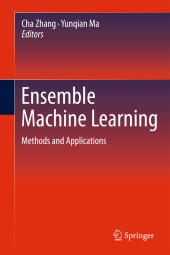 Neuerscheinungen 2014Stand: 2020-02-01 |
Schnellsuche
ISBN/Stichwort/Autor
|
Herderstraße 10
10625 Berlin
Tel.: 030 315 714 16
Fax 030 315 714 14
info@buchspektrum.de |

Yunqian Ma, Cha Zhang
(Beteiligte)
Ensemble Machine Learning
Methods and Applications
Herausgegeben von Zhang, Cha; Ma, Yunqian
2012. 2014. viii, 332 S. 13 Tabellen. 235 mm
Verlag/Jahr: SPRINGER, BERLIN; SPRINGER NEW YORK; SPRINGER 2014
ISBN: 1-489-98817-3 (1489988173)
Neue ISBN: 978-1-489-98817-1 (9781489988171)
Preis und Lieferzeit: Bitte klicken
The primary goal of this book is to give readers a complete treatment of the state-of-the-art ensemble learning methods. It also provides a set of applications that demonstrate the various usages of ensemble learning methods in the real-world.
It is common wisdom that gathering a variety of views and inputs improves the process of decision making, and, indeed, underpins a democratic society. Dubbed "ensemble learning" by researchers in computational intelligence and machine learning, it is known to improve a decision system´s robustness and accuracy. Now, fresh developments are allowing researchers to unleash the power of ensemble learning in an increasing range of real-world applications. Ensemble learning algorithms such as "boosting" and "random forest" facilitate solutions to key computational issues such as face recognition and are now being applied in areas as diverse as object tracking and bioinformatics.
Responding to a shortage of literature dedicated to the topic, this volume offers comprehensive coverage of state-of-the-art ensemble learning techniques, including the random forest skeleton tracking algorithm in the Xbox Kinect sensor, which bypasses the need for game controllers. At once a solid theoretical study and a practical guide, the volume is a windfall for researchers and practitioners alike.
Introduction of Ensemble Learning.- Boosting Algorithms: Theory, Methods and Applications.- On Boosting Nonparametric Learners.- Super Learning.- Random Forest.- Ensemble Learning by Negative Correlation Learning.- Ensemble Nystrom Method.- Object Detection.- Ensemble Learning for Activity Recognition.- Ensemble Learning in Medical Applications.- Random Forest for Bioinformatics.
From the reviews:
"The book itself is written by an ensemble of experts. Each of the 11 chapters is written by one or more authors, and each approaches the subject from a different direction. ... This is an excellent book for someone who has already learned the basic machine learning tools. It would work well as a textbook or resource for a second course on machine learning. The algorithms are clearly presented in pseudocode form, and each chapter has its own references (about 50 on average)." (D. L. Chester, ACM Computing Reviews, July, 2012)


